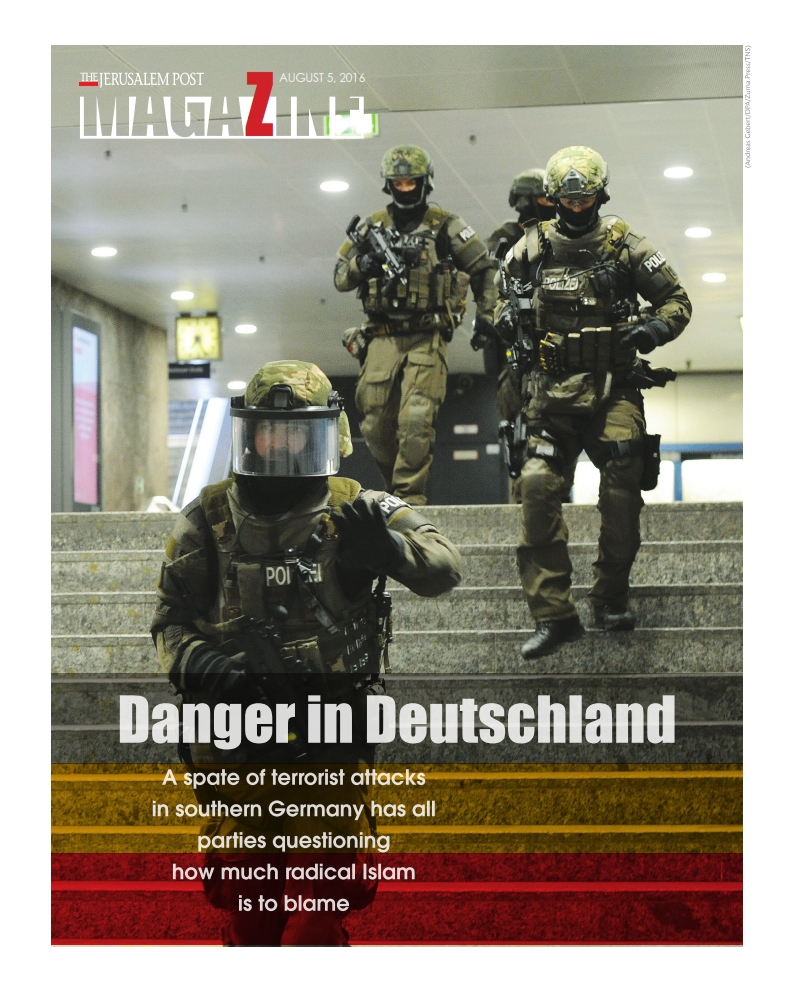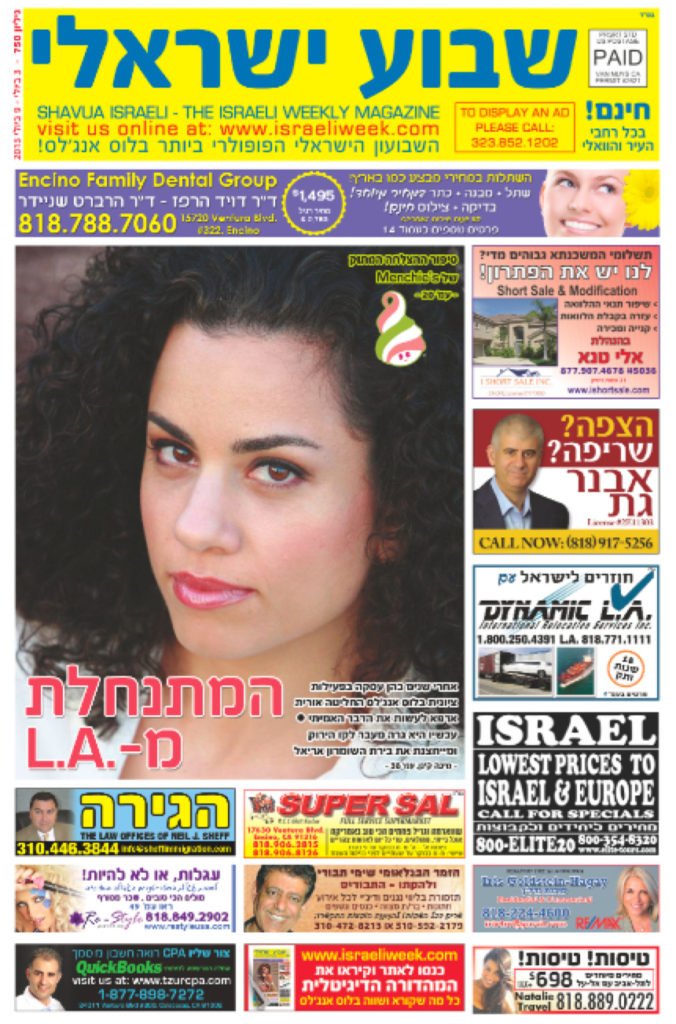Jerusalem Post Magazine Cover Story, August 5, 2016
Click here for the online version (for subscribers)
Click here for the print version as a PDF
BERLIN – Halfway into a Krav Maga class for women – teaching the Israeli developed self-defense method – Oliver Hoffmann, founding manager of the Combat and Counterterrorism School in Berlin, presented a case study.
He showed a short clip, shot on a smartphone, of a shooter coming out of a McDonald’s in Munich aiming for youths who had left through a different door, seeking an escape. This was the first time Hoffmann used in his lessons an attack of this kind that took place in Germany. Judging from the video, it seems the frantic victims did not respond wisely
Hoffmann, a native Berliner with an Israeli mother, also runs a security company that secures Jewish institutions and private companies in Germany. His close ties to Israel keep him up-to-date on counterterrorism techniques and sensitive to trends in terror. He foresaw that “lone wolf” terrorist attacks, which have in the last year become part of the Israeli landscape, would soon appear on German soil.
He designed the security concept for the 2015 Maccabi Games in Berlin and in his experience, the police are not wholly prepared for the type of terror that is becoming ever-present on European soil.
“There was a real fight with the police, in which I said it’s not enough to put two or three policemen in the street; we need to block it with police cars,” Hoffmann said, explaining that cars blocking the street would have also been effective in preventing a truck from ramming into Bastille Day celebrations in Nice, France, on July 14.
“We need to prevent knife attacks,” he says. “We knew it for a long time, but it was hard to convince the people of Germany to do that. Now everybody understands. Now people called me last week to say: ‘you were right.’”
Terrorism or psychosis?
Four back-to-back attacks within the span of one week in late July have shocked Germany. First, a teenager axed people on a train in Würzburg, wounding four, two seriously. He was initially identified as an Afghani asylum seeker, but he may have been a Pakistani posing as an Afghani to claim asylum. The Munich shooting spree that killed nine came next, reported to have been perpetrated by a German citizen of Iranian descent. While initial media reports claimed the Munich shooter shouted “Allahu Akhbar” during the July 23 assault, later reports speculated that the attack was more akin to American-style shooting sprees committed by disturbed students. The next day, a man identified as a Syrian refugee stabbed a pregnant Polish woman with a machete in front of a fast-food restaurant near Stuttgart. Finally, a man identified as a Syrian asylum seeker wounded 12 in a suicide bombing outside a music festival near the town of Ansbach. In the first and last attack, the terrorists were reported to have claimed allegiance to the Islamic State.
The inconclusive nature of some of these attacks has caused Germans to wonder: Is this the work of Islamic terrorists or just plain crazy people? A spokesman for the Interior Ministry, in an email interview, could not categorize the attacks: “Please accept my apologies that I cannot give any detailed information as the investigations in these cases are still ongoing.”
A man-on-the-street survey I recently conducted in central Berlin favors the “crazy people” theory: “In my view the motive for the most recent attacks can be seen in individual despair that may come in the guise of an Islamic State ideology justified attack,” said Alexander, a lawyer, on a tram.
“It seems people are not happy in Syria or Afghanistan – people around the world are not happy, and they don’t care about the next generations, so for sure it [terrorism] has to increase more,” said Moritz, at a hip café.
At an Israeli-owned hummus joint, Bernard, an unassuming priest and post-doc, was hesitant to blame radical Islam. “I think maybe it’s difficult to talk about these incidents as terrorist attacks – it’s a bit complicated.”
Henryk Broder, a prominent polish- born Jewish-German author and commentator on German affairs, thinks the theory that these attacks were motivated by mental disturbance is its own psychosis. A columnist for Die Welt, he was among the few voices in the media warning Germany of an uptick in terror, especially in the wake of the migrant influx in 2015 which saw over a million asylum seekers enter Germany.
“Germany’s in a state of denial,” Broder said over tea at a café near the ritzy Ku’damm street, sprinkling the conversation with the blunt, incisive descriptions for which he is famous. He clarified that “Germany” refers to the government, intellectual elites, and the mainstream media. “The rank and file are totally different. The rank and file are always considered to be a little bit stupid, uneducated – how you say? – retarded. They’re not.”
He believes the “rank and file,” i.e. “regular” Germans, reject what he believes is the establishment’s deliberate downplaying of the terror threat and its links to radical Islam.
“It’s like minutes after the Titanic hit the iceberg,” Broder said. “They try to maintain the good mood and the orchestra is still playing.”
The root of the problem
At a press conference in Germany on July 26, Chancellor Angela Merkel cut short her summer vacation to address the nation, expressing no regret for the asylum policy she led last year but which has since undergone tighter restrictions.
“We can still do this. We can manage this historic challenge,” she said.
According to the Internet pollster YouGov, the general public was not convinced. Forty-eight percent did not agree at all and 18 percent said they slightly disagree with Merkel’s “we can do this” mantra. At the press conference, she also delineated a plan for beefing up security, which included increased intelligence and surveillance.
A day later, German police raided a Hildesheim mosque known to preach the Salafist brand of radical Islam, on the hunt for extremists.
The Ministry spokesperson stopped short of correlating the rise in attacks with Merkel’s open-door policy.
“As [German Interior Minister Thomas] de Maizière said in a recent interview with German magazine Der Spiegel, the terrorist threat was considerable already before the big numbers of refugees arrived and it is still considerable now. Of course, the authorities get information from time to time indicating cases where there might be terrorists among the refugees. Naturally, the authorities conduct thorough investigations as quickly as possible in these cases,” he said.
According to experts, there is some truth to the contention that Germany was prone to terror long before the mass migration last year.
Ahmad Mansour, an Israeli-Arab born in Tira who moved to Germany 12 years ago, is one of the few liberal Muslim voices speaking out against the threat of radical Islam. His work as program director for the European Foundation for Democracy and his book Generation Allah aims to prevent radicalization, a threat he believes has been exacerbated by Merkel’s under-debated immigration policy and the German government’s support of institutions affiliated with the Muslim Brotherhood and Turkish nationalism.
“You must deal with the root of the problem, and the root of the problem isn’t ISIS and al-Qaida; it’s political Islam, which is getting stronger in Germany at a worrying rate,” he explained.
Mansour acknowledged that each terrorist may have had a different motive, and he separates the Munich attacks from the others.
“Nevertheless, there are people who try to explain [all of] these incidents [the recent attacks] by talking about people with psychological problems, and maintaining that this has nothing to do with Islam.”
This pattern extended to the terrorist attacks in Nice and Orlando, with some media reports opining that the terrorists became quickly radicalized due to personal or mental problems.
“There is a new concept that many people with a security background want to convey to the public: turbo extremism, people who started to pray in the last week and suddenly became extremists.
It’s a load of rubbish. This ideology is not built in a week. They carry the ideology – or a version of the ideology – for many years,” he said.
According to Bill Roggio, an American commentator on Islamic terrorism and Senior Fellow at the Washington DCbased Foundation for Defense of Democracies, mental disturbance and radical Islam are not mutually exclusive. “Someone could be mentally disturbed as well as identify as a jihadist. It certainly takes a certain type to blow themselves up or to do the horrific things these people do.
“In the case of these [lone wolf] attacks,” he continued, “they’re doing what both al-Qaida and the Islamic State have called for: if you can’t come to Syria or Afghanistan or wherever you want to fight, take your fight at home,” Roggio explained.
Even in cases in which ISIS takes credit for an attack, he has noticed that European governments avoid branding them as part of a global jihad network, which seeks to install a worldwide caliphate that enforces Sharia law.
All analysts interviewed agree that Germany is in a quagmire.
According to Mansour, Germany must brace itself for more “lone wolf” attacks: “The more we deal with the topic and the more security gets organized, it’ll be easier to thwart big terrorist attacks, but individuals who act on their own, who aren’t organized – that’s the future of Europe.”
Mansour recommended, as a first step, discussing the problem. But, he said, Germany “is not willing to conduct intelligent discussions about the problem.”
“The situation is so bad because it’s irreversible,” Broder, the Die Welt columnist, said. “You cannot turn back the clock and of course you cannot deport people, but they don’t know who is here. Hundreds of thousands of people disappeared; the estimate is at least 400,000. No papers. No documentation. Nothing.”
Criticism of radical Islam is often avoided lest peaceful, law-abiding refugees fall victim to stereotyping and defamation.
Broder attributes Germany’s fear of cracking down on a specific ethnic group to an inverse nationalism in which Germans feel the need to be custodians of the “other.”
In today’s Germany, he said, “Muslims are the Jews of today.”
“The Germans always need someone they could take care of, in the positive or the negative,” he said. “The negative way would be to annihilate the tribe. The positive way would be to take care of an ethnic group because in both cases they enjoy the feelings of superiority.”
Not in my name
The terrorist attacks have put the refugee population on edge as well. A Syrian refugee who has covered the migrant crisis as a journalist and who asked to remain anonymous said he fears a backlash against this population, which would only set back their integration.
As a Muslim refugee, he very much appreciates the opportunities Berlin has given him. In the wake of the terror wave, he described his feelings as “shock, followed by disbelief, anger, sadness and not the least worry.”
He has not experienced any backlash personally, although a friend of his was spat on and verbally attacked.
Commenting on the motives of the attackers, he wrote via email: “It is rather a psychological question, spiced up with incoherent, fake religious ideas. As a whole, I think it is about gaining more power and control, and breaking the World Rule as we know it. Their ideology is deadliest and most effective if everyday people start fearing refugees. Europe has faced its biggest horrors when regular people started segregating masses of people based on their origins. I fear a future like that.”
At a weekly get-together at a bar in Berlin for city newcomers, a refugee from Damascus named Abd Han, who takes advantage of these opportunities to integrate into mainstream German society, told me, in his limited German, that he believes most Syrian refugees are decent, educated people and professionals, such as students, doctors and pharmacists, who eschew terrorism. But he also acknowledged that he has met refugees in his circles who express admiration for ISIS.
As a non-practicing Muslim with a fondness for Israel, who has conducted research on the Syrian Jewish community, he asked me to take him to synagogue; in return, he invited me to his abode where he lives with asylum-seekers from various countries.
“Just don’t come with your star,” he warned, pointing to my Star of David pendant.
Hagar Levin, an Israeli with German roots who moved to Berlin four years ago, works for Morus 14, an organization dedicated to providing educational and recreational services to children and teenagers of immigrant families living in Neukölln, a district housing a significant immigrant population from Turkey and Arab countries but which is also in the process of gentrification, making it a hot spot for Berlin hipsters.
“Many of them are not happy with the refugee problem,” Levin said of the mentees at the center who were born to immigrants who came before the 2015 influx.
“They do not see themselves in them. It’s hard to say the reasons. They don’t want people to ruin their good name.”
Levin runs a subgroup, Shalom Rollberg, dedicated to combating anti-Semitism in these communities by fostering positive encounters and mentoring relationships between Jews/Israelis and children/teenagers who were taught that Jude is a curse word. While she is sensitive towards not generalizing about the immigrant community, she believes critical discussion about the Islamic motivations behind the attacks is warranted.
“I think there is too much caution against saying that people committed an attack in the name of a religion,” Levin said. “Of course, every individual has their own personal background which causes them to act in a certain way, but you can’t ignore that there is one characteristic that is mutual to lots of the terrorist attacks in the last few months, and it’s okay to say it’s a problem… Radical Islam exists. It’s a problem in Germany. I see it in everyday life. I see it in children and teenagers. You can’t ignore it.”
She believes one solution is the type of work she does: re-educating children and teenagers steeped in radical interpretations of Islam towards the ideals of tolerance and religious freedom. In her experience, admiration for ISIS is often raised among youth in the third person, as a phenomenon they encounter among their peers.
“It’s not like they say ‘I’m against’ or ‘for it’ but they ask questions and raise a discussion. I think they’re looking for places to talk about things, and they can’t necessarily talk about it at home.”
Levin believes that Germany did the right thing in accepting refugees from war torn countries, even if it entailed risks, comparing Germany’s quagmire to Israel’s, in which the peace process will necessarily involve some danger.
“You can’t solve everything in a really short amount of time,” Levin said. “We have to accept that it’s a process and unfortunately, things like that happen.”
The writer is a journalist based in Berlin. She is author of The Settler, a novel of modern Israel.


